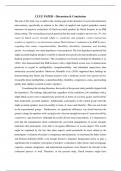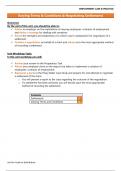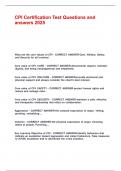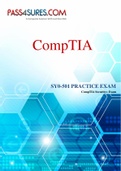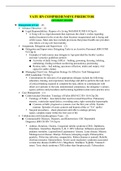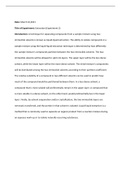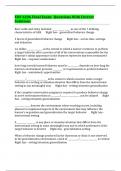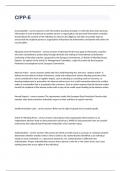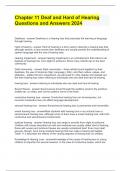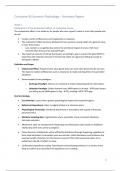CLUE PAPER - Discussion & Conclusion
The aim of the study was to address the existing gaps in the literature of accent discrimination
interventions, specifically in relation to the effect of implicit and explicit prejudice control
measures on negative evaluations of Dutch-accented speakers by Dutch listeners in an EMI
hiring setting. The overarching research question that the study sought to answer was: To what
extent do Dutch accent strength (slight vs. moderate) and prejudice control instructions
(explicit vs. implicit vs. no instructions) impact Dutch listeners' evaluation of an EMI lecturer,
regarding their status, comprehensibility, likeability, hireability, dynamism, and teaching
quality. Accordingly, two main hypotheses were proposed. The first hypothesis predicted that
slight accented English speakers would be evaluated more positively than moderately accented
English speakers by Dutch listeners. This assumption was based on findings by Hendriks et al.
(2021) who demonstrated that EMI lecturers with a slight Dutch accent were evaluated more
positively in regard to intelligibility, comprehensibility, and attitudinal impressions than
moderately accented speakers. Moreover, Hendriks et al. (2018) supported these findings by
demonstrating that Dutch and German teachers with a moderate accent were perceived less
favourable about intelligibility, comprehensibility, likability, competence, status, and teaching
quality than slightly accented or native speakers.
Considering the existing literature, the results of the present study partially aligned with
the hypothesis. The findings indicated that, regardless of the conditions, job candidates with a
slight Dutch accent were evaluated more positively in terms of teaching quality and hirability
than moderately accented speakers. Additionally, participants in the control group rated the
slight accented speakers more favourably in terms of status and likability. This was not found
in the experimental groups. Furthermore, no significant difference was found between the
group’s ratings for speakers with varying levels of accent strength in terms of comprehensibility,
competence, and dynamism. Although the results did not meet expectations, it is important to
note that the manipulation check confirmed the successful manipulation of accent strength,
indication that participants were able to recognize differences in accent degree. The results
might be explained by the fact that other aspects could potentially be more salient in the
participants’ evaluation of teacher’s competence and dynamism. As mentioned by Inbar-Lourie
and Donitsa-Schmidt (2020), even though lecturer’s linguistic background seems to play a
significant role in students’ perception of teachers’ competence, other factors such as language
expertise, content competence, and international experience were found to be relevant in the
evaluation process as well. Therefore, in the present study, Dutch listeners might have
, considered other factors such as content competence, as more important than accent strength
during competence evaluation. Additionally, when assessing dynamism, participants were
asked to consider whether teachers sounded ‘energetic’, ‘talkative’, ‘cheerful’, and ‘active’.
Hence, listeners may have perceived factors such teacher’s intonation, loudness, and speech
rate as more salient that accent strength when rating them. Consequently, it can be suggested
that accent strength may not be as salient as previously assumed.
The second hypothesis predicted a positive effect of prejudice control instructions
(explicit vs implicit) on the evaluation of non-native speakers by Dutch listeners in terms of
status, comprehensibility, likeability, hireability, dynamism, and teaching quality compared to
no instructions for both accent strengths (slight & moderate). This claim was mainly based on
Rossel et al. (2019) who demonstrated that raising awareness about accent-based
discrimination can potentially lead to a more favourable speaker evaluation. In addition, the
study also focused on speaker evaluations from listeners with the same language background,
highlighting the effect of awareness raising prejudice control measures regardless of shared
language background. Contrary to expectations, the prejudice control instructions (explicit vs
implicit) had only partial benefits for evaluation non-native speakers with different accents
strength compared to the control group. The implicit prejudice control condition showed a
slight positive effect, with participants rating the moderately accented speaker more positively
in terms of status and likeability than the control group. This outcome may be attributed to the
recognition of the shared language background by participants, as indicated by the successful
manipulation check whereby most subjects recognized the speaker’s country of origin. As
listeners with the same language background tend to evaluate non-native speakers more
negatively due to a sense of shame (Hendriks et al.,2021; Hendriks et al., 2018), the prejudice
control measures, especially explicit ones, may have had limited impact. The effectiveness of
implicit measures on status and likeability may be attributed to their focus on overarching
aspects of a speaker. Consequently, positive cultural stereotypes associated with the status and
likability of Dutch individuals could have influence participants evaluation when they were not
explicitly made aware of the study purpose, hence in implicit condition.
5.2 Limitations & Future Research
While the study offered valuable insights into the influence of prejudice control measures and
accent strength on Dutch listeners’ speaker evaluation, it is important to also acknowledge the
limitations of the study. Firstly, it is important to acknowledge the limitation related to the
study’s attempt to replicate a job interview setting using short speech samples generated by
The aim of the study was to address the existing gaps in the literature of accent discrimination
interventions, specifically in relation to the effect of implicit and explicit prejudice control
measures on negative evaluations of Dutch-accented speakers by Dutch listeners in an EMI
hiring setting. The overarching research question that the study sought to answer was: To what
extent do Dutch accent strength (slight vs. moderate) and prejudice control instructions
(explicit vs. implicit vs. no instructions) impact Dutch listeners' evaluation of an EMI lecturer,
regarding their status, comprehensibility, likeability, hireability, dynamism, and teaching
quality. Accordingly, two main hypotheses were proposed. The first hypothesis predicted that
slight accented English speakers would be evaluated more positively than moderately accented
English speakers by Dutch listeners. This assumption was based on findings by Hendriks et al.
(2021) who demonstrated that EMI lecturers with a slight Dutch accent were evaluated more
positively in regard to intelligibility, comprehensibility, and attitudinal impressions than
moderately accented speakers. Moreover, Hendriks et al. (2018) supported these findings by
demonstrating that Dutch and German teachers with a moderate accent were perceived less
favourable about intelligibility, comprehensibility, likability, competence, status, and teaching
quality than slightly accented or native speakers.
Considering the existing literature, the results of the present study partially aligned with
the hypothesis. The findings indicated that, regardless of the conditions, job candidates with a
slight Dutch accent were evaluated more positively in terms of teaching quality and hirability
than moderately accented speakers. Additionally, participants in the control group rated the
slight accented speakers more favourably in terms of status and likability. This was not found
in the experimental groups. Furthermore, no significant difference was found between the
group’s ratings for speakers with varying levels of accent strength in terms of comprehensibility,
competence, and dynamism. Although the results did not meet expectations, it is important to
note that the manipulation check confirmed the successful manipulation of accent strength,
indication that participants were able to recognize differences in accent degree. The results
might be explained by the fact that other aspects could potentially be more salient in the
participants’ evaluation of teacher’s competence and dynamism. As mentioned by Inbar-Lourie
and Donitsa-Schmidt (2020), even though lecturer’s linguistic background seems to play a
significant role in students’ perception of teachers’ competence, other factors such as language
expertise, content competence, and international experience were found to be relevant in the
evaluation process as well. Therefore, in the present study, Dutch listeners might have
, considered other factors such as content competence, as more important than accent strength
during competence evaluation. Additionally, when assessing dynamism, participants were
asked to consider whether teachers sounded ‘energetic’, ‘talkative’, ‘cheerful’, and ‘active’.
Hence, listeners may have perceived factors such teacher’s intonation, loudness, and speech
rate as more salient that accent strength when rating them. Consequently, it can be suggested
that accent strength may not be as salient as previously assumed.
The second hypothesis predicted a positive effect of prejudice control instructions
(explicit vs implicit) on the evaluation of non-native speakers by Dutch listeners in terms of
status, comprehensibility, likeability, hireability, dynamism, and teaching quality compared to
no instructions for both accent strengths (slight & moderate). This claim was mainly based on
Rossel et al. (2019) who demonstrated that raising awareness about accent-based
discrimination can potentially lead to a more favourable speaker evaluation. In addition, the
study also focused on speaker evaluations from listeners with the same language background,
highlighting the effect of awareness raising prejudice control measures regardless of shared
language background. Contrary to expectations, the prejudice control instructions (explicit vs
implicit) had only partial benefits for evaluation non-native speakers with different accents
strength compared to the control group. The implicit prejudice control condition showed a
slight positive effect, with participants rating the moderately accented speaker more positively
in terms of status and likeability than the control group. This outcome may be attributed to the
recognition of the shared language background by participants, as indicated by the successful
manipulation check whereby most subjects recognized the speaker’s country of origin. As
listeners with the same language background tend to evaluate non-native speakers more
negatively due to a sense of shame (Hendriks et al.,2021; Hendriks et al., 2018), the prejudice
control measures, especially explicit ones, may have had limited impact. The effectiveness of
implicit measures on status and likeability may be attributed to their focus on overarching
aspects of a speaker. Consequently, positive cultural stereotypes associated with the status and
likability of Dutch individuals could have influence participants evaluation when they were not
explicitly made aware of the study purpose, hence in implicit condition.
5.2 Limitations & Future Research
While the study offered valuable insights into the influence of prejudice control measures and
accent strength on Dutch listeners’ speaker evaluation, it is important to also acknowledge the
limitations of the study. Firstly, it is important to acknowledge the limitation related to the
study’s attempt to replicate a job interview setting using short speech samples generated by


